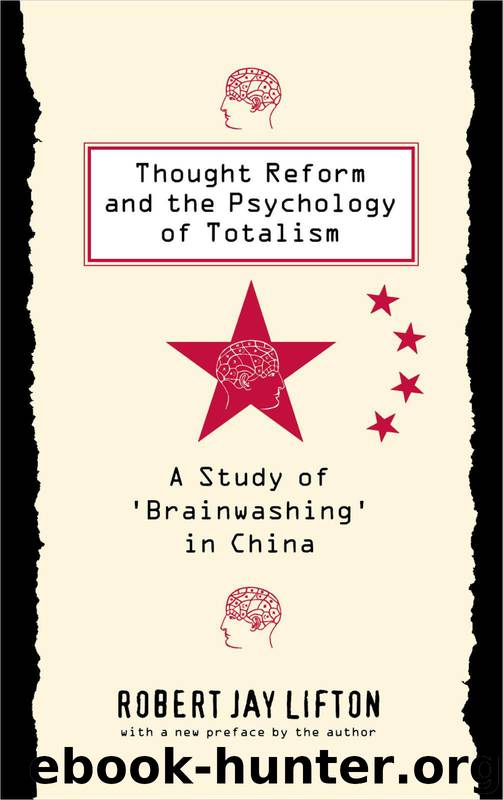Thought Reform and the Psychology of Totalism: A Study of 'brainwashing' in China by Robert Jay Lifton

Author:Robert Jay Lifton
Language: eng
Format: mobi
Publisher: University of North Carolina Press
Published: 2011-12-31T16:00:00+00:00
Hu began to sense that the cadres were antagonistic to him, and he feared that, should he make one false move, they might well label him a “reactionary”—a dangerous accusation for anyone. He found himself in the paradoxical position of still retaining his general faith in the Chinese Communist movement, while feeling increasingly trapped in his personal thought reform experience.
His dilemma increased as the moralistic tone of the criticism and self-criticism process extended into every aspect of his daily existence. As in the prison setting (but in a “native” rather than “imperialist” frame) students were criticized for such “bourgeois” or “ruling class” characteristics as pride, conceit, greed, competitiveness, dishonesty, boastfulness, and rudeness. And when liaisons between the sexes developed (the revolutionary university was co-educational, although living quarters for men and women were completely separate) these were discussed within the small groups and evaluated solely in terms of their effect on the reform progress of the two people involved. If a “backward” girl friend was thought to be impeding a student’s progress, he was advised to break off the relationship; but if both were “progressive,” or if one were thought to be aiding the other’s progress, the group would give its approval. One female activist gave evidence of a romantic interest in Hu, but he was unresponsive and highly suspicious (probably with justification) of her motives. Sexual unions were, on the whole, discouraged, as it was felt that they drained energies from the thought reform process. The opportunity for romance was limited anyway, since the days were taken up almost completely by hsüeh hsi, and the evenings by additional meetings and by reading. Sunday, although nominally a day of rest, was frequently devoted to self-examinations that had not been completed during the week; and such entertainments as there were—movies, plays, group singing, and dancing—were invariably tied in with some aspect of the Communist ideological message. Students in Hu’s section were not expected to leave the grounds of the revolutionary university unless they had some special reason.
As in prisons, the atmosphere became saturated with individual confessions. Instead of criminal activities, each student was expected to reveal everything about past affiliations with “reactionary” groups (usually the KMT regime or its student organizations). Each course became a vehicle for exposing more of his own self, for condemning more of the evil in his character. Each student developed a running confession, compounded of self-criticisms, thought summaries, and extracurricular self-examinations; this was a major indicator of his progress in reform. Taking shape both orally and in writing, its content became known to other students and to cadres and class heads. One’s eagerness to reveal himself seemed to be more important than any specific thing revealed.
Like the Western prisoners, students vied to outdo each other in the frankness, completeness, and luridness of their individual confessions: one group would issue a challenge to another to match its collective confessions; personal confession became the major topic of discussion in small group meetings, large student gatherings, informal talks with cadres, articles posted upon bulletin boards, and “wall newspapers.
Download
This site does not store any files on its server. We only index and link to content provided by other sites. Please contact the content providers to delete copyright contents if any and email us, we'll remove relevant links or contents immediately.
The Art of Thinking Clearly by Rolf Dobelli(10457)
Mindhunter: Inside the FBI's Elite Serial Crime Unit by John E. Douglas & Mark Olshaker(9324)
Change Your Questions, Change Your Life by Marilee Adams(7762)
Nudge - Improving Decisions about Health, Wealth, and Happiness by Thaler Sunstein(7694)
Mastermind: How to Think Like Sherlock Holmes by Maria Konnikova(7324)
The Power of Now: A Guide to Spiritual Enlightenment by Eckhart Tolle(5761)
Men In Love by Nancy Friday(5234)
Altered Sensations by David Pantalony(5094)
Factfulness: Ten Reasons We're Wrong About the World – and Why Things Are Better Than You Think by Hans Rosling(4737)
The Confidence Code by Katty Kay(4251)
Thinking in Bets by Annie Duke(4218)
Man and His Symbols by Carl Gustav Jung(4131)
The Worm at the Core by Sheldon Solomon(3486)
Why Buddhism is True by Robert Wright(3447)
Liar's Poker by Michael Lewis(3442)
Three Women by Lisa Taddeo(3425)
The Inner Life of Animals by Peter Wohlleben(3311)
Descartes' Error by Antonio Damasio(3271)
How Music Works by David Byrne(3262)
